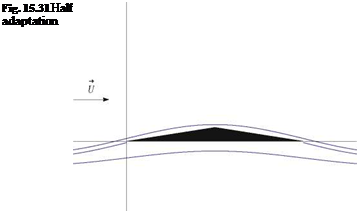2-D Inviscid, Linearized, Thin Airfoil Theories
15.8.1.1 Incompressible Flow (Mo = 0)
Profile Geometry
Consider a half-double wedge profile of chord c of equation
f + (x) = d(x) + 1 e(x) = 0x, 0 < x < §
f + (x) = d(x) + §e(x) = 0(c – x), § < x < c
1
f (x) = d(x) – §e(x) = 0, 0 < x < c
See Fig. 15.30. The camber d(x) and thickness e(x) distributions are given by
d(x) = 1 (f+(x) + f-(x) = §0x, 0 < x < §
d(x) = 1 (f + (x) + f-(x) = 10(c – x), § < x < c
e(x) = f+(x) — f-(x) = 0x, 0 < x < §
e(x) = f +(x) — f-(x) = 0(c — x), § < x < c
Fourier Coefficients
The expressions of the Fourier coefficients A0 and An in the expansion of the vorticity for an arbitrary profile are
z/c
в/2
0.5
Fig. 15.30 Half double-wedge geometry
1 п. 2 n.
A0 = a — d [x(t)]dt, An — d [x(t)]cosntdt
п о п о
A0 and A2 is given by
Ao — a — — dt + ^ ^—— ) dt[ — a
A1 is given by
22 0 п 0 2 0 2 A1 — costdt + — costdt — {1 — (—1)} — 0
п 02 п 2 п 2 п
A2 is given by
2 2 0 п 0 2 0 A2 — – — cos2tdt + — — cos2tdt — — — {0 — (—0)} — 0
 |
|
The incidence of adaptation aadapt is such that A0 — 0. Here we have aadapt — 0. See Fig. 15.31.
Definition of Aerodynamic Center
The aerodynamic center is the point about which the moment of the aerodynamic forces is independent of a.
Aerodynamic Coefficients
The aerodynamic coefficients C;(a) and Cm, o(a) are given in terms of the Fourier coefficients
 Cl (a)
Cl (a)
Cm, o(a) —











